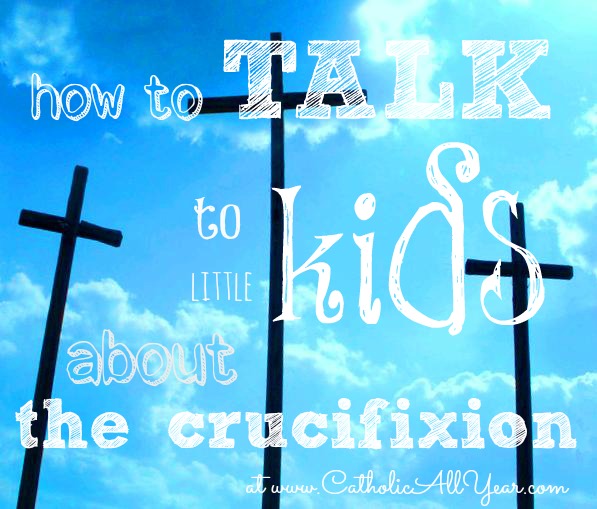
How much of Jesus’ suffering and death to share with little ones is a question many parents struggle with.
It can be overwhelming to feel like you have to introduce so many facts and concepts and characters all at once, especially if your kids are perhaps more concerned with how close they are to getting to eat treats again than with the details of Jesus’ passion.
How to handle it in your own family is going to depend, of course, on your particular kids.
But here’s how we do it in our family:
We give them the facts.
Over the course of Holy Week each year, I read to my kids the story of Jesus’ passion and death from the Bible.
They’ve heard it in Mass, but especially the little ones are probably not paying much attention there. Reading it at home allows them to really hear it.
There are differences in what parts of the story are included in each gospel account, (for what they are see here). Anyone you choose would be great since they’re all the Bible. But I like to read from our Children’s Bible, which compiles all of the events from each of the gospels into one narrative. It’s also illustrated, which I find really helps to keep the kids’ attention and assists with their reading comprehension.
I read some each day, focusing on the part of the story that happened on that particular day of the week.
I don’t leave out any parts or soften anything, even for very little kids. I just read it to them as is, and we look at the pictures.
Even though my two-year-old isn’t ready to understand everything that happens in the story, and he’s certainly not ready to grasp the horrors of Jesus’ suffering, I do think he is ready to hear about it.
I tell all the kids that we’re going to read the story first, with no interruptions, then talk about it afterward.
Once the story is read, I let the kids lead the conversation.
Some kids are going to listen, and then just want to move on. That’s fine. Especially for toddlers, my focus is just that they listen. Hearing it in its entirety will plant the seeds for deeper reflection and understanding later. My toddlers have never been upset by hearing the story.
For my pre-schoolers and younger grade school kids, I want to make sure they understand the basics of what happened.
This is what I’d like them to know:
- The Last Supper is when Jesus celebrated the Passover with his friends the disciples. Passover is the day the Jewish people remember when God saved them from being slaves in Egypt. This happened on Holy Thursday night.
- Jesus’s friend Judas left the supper and betrayed Jesus by telling the Jewish priests where Jesus would be so they could arrest him. The high priest, Caiaphas, wanted to get rid of Jesus because he could see how much the people liked him and he worried the people wouldn’t listen to him anymore and would listen to Jesus instead.
- Still that night, Jesus prayed in the Garden of Gethsemane. He was very worried about all the terrible things he knew were about to come, but he was willing to do what God wanted him to do.
- Judas came with many people and found Jesus in the garden. Jesus was arrested.
- Peter followed behind Jesus to see what happened to him. When people asked him if he knew Jesus, he got scared and lied and said he didn’t know Jesus at all.
- The next morning, on Good Friday, the high priest turned Jesus over to the governor, Pontius Pilate. Pontius Pilate knew Jesus hadn’t done anything wrong. But Pontius Pilate worked for Rome, and it was his job to make sure the people didn’t make trouble. He wanted to let Jesus go, but all the people kept shouting “Crucify him!” He had Jesus whipped to see if that would make the people happy, but they kept shouting “Crucify him!” Pontius Pilate was a weak man, so even though he knew it was not right, he ordered his soldiers to crucify Jesus.
- Jesus had to carry his heavy cross out of the town of Jerusalem, up the hill to Golgotha. It was very hard to do. He fell down many times. The soldiers thought Jesus might not make it up the hill at all, so they made a man named Simon of Cyrene help him.
- Jesus’ hands and feet were nailed to the cross, and he was left to die there, in between two criminals who were also being crucified that day, as a punishment for their crimes.
- The people in the crowd made fun of Jesus, the soldiers mocked him and took his clothing. Only one disciple, John, and Mary, Jesus’ mother, and two other women stayed with Jesus while he was dying. All of his other friends and followers ran away.
- Jesus was on the cross for three hours, from noon to three o’clock. Then he died.
- The soldiers took his body down from the cross and gave him to his mother, Mary.
- A rich man named Joseph of Arimathea came and took Jesus’ body, laid it in his own tomb, and covered the entrance with a stone.
If they have questions, I answer them. If they don’t have questions, that’s fine.
I want my older kids to learn more details of the story and have a deeper understanding of the people involved and their motivations, but that comes with time and multiple exposures to the story.
If my kids ask me, “Why? Why did Judas do that? Why did Pontius Pilate do that? Why did the people do that? Why did God want it? Why did Jesus let them?” I try to answer with truth and compassion but not too many details.
Judas and Peter and Caiaphas and Pontius Pilate and Herod and the good and bad thieves and the crowd are all weak in different ways. They are all sinners like us. They hurt Jesus. But so do we hurt Jesus when we sin. The thing that makes them different from one another is whether they trusted God and asked for forgiveness after they sinned, or if they didn’t. The same is true of us.
It is because people don’t love God enough that God had to send Jesus to suffer and die for us. Jesus came to make up in a big way for all of our sins, big and little. From the sin committed by Adam and Eve, all the way to the sins that people are committing today, even the sins we ourselves commit.
Jesus loved God so much and loved us so much, that he willingly went through all that suffering. Jesus loved YOU so much that he died for YOU, even though he was God and could’ve stopped all of it at any time.
Even though Jesus suffered so much, this is a story with a happy ending. We just have to make it through Holy Saturday, our day of waiting and preparing, to find the joy of Easter morning, when Jesus comes back to life and triumphs over death and saves us all.
That’s what I tell them.
Even though this is my little kids’ first (and mostly only) exposure to heavy concepts like betrayal and suicide and torture and death, I have found that they have always been able to see through all of that and understand that Jesus’ passion is a story of love.
I think even the littlest kids deserve to hear it.


Love this! Thank you!!!!
Wonderful way to introduce and reintroduce our salvation story to your children. We have the same tradition, reading from the Children's Bible each day of Holy Week, leading up to Good Friday and Jesus' death on the cross. On Easter Monday, we celebrate His resurrection by reading the Gospel story (with pictures!) just like we did at mass the day before. I have five children, and none have been frightened, some more curious than others, but they absorb the Truth by hearing it again and again, delving deeper as they grow in wisdom and understanding. Thank you for sharing this!
This is so wonderful! I think kids can understand a lot more about the story than we give them credit for. Letting them hear it and discuss what it means to them is a great way for them to cultivate a personal relationship with Jesus and his sacrifice for us.
My son is only 7 months, but you inspired me to go ahead and pull out the children's story bible we have and read it to him! He may not remember, but it's good for me to start these important things now instead of waiting till some magical age of "readiness"!
Thanks for this post! I've been taking my 3 yr olds to adoration for a little bit a few times a week and this week they noticed the changes in the church (as it is being prepared for Holy Thursday/Good Friday). They wanted to know why and I was having trouble explaining it to them — not sure exactly how detailed to get. This is very helpful!
I grew up with parents who sheltered us from a lot of things but I can't ever remember a time that I didn't know and understand the crucifixion and resurrection. I don't even remember having any inclination to shelter my own kids from the story. It's something everyone needs to know and understand. It never gets old and it never loses it's impact on my heart.
every night we (usuall hubby) leads the kids in a decade of the Rosary, with 1 mystery that he explains to them. It has taken over a year to get to the point where they actually listen and pray along, but I really saw the fruits of it on Sunday, when our church put on a passion play. When the kids had trouble understanding what was going on, I could whisper in their ear "look, it's the third sorrowful mystery!" and I could see that they remembered and started paying attention again.
Great post! Thanks for sharing it!
Thanks for such good ideas Kendra. I'm going to dig out our childrens Bible for Genevieve. I would also like to buy that Tomie De Paolo book of Bible stories you recommended.
I love reading your thoughts on this. And, I was hoping to get your insight on something.
You mentioned this above:
"It is because people don't love God enough that God had to send Jesus to suffer and die for us."
I've had people ask me why God is so vain. Why did He create us to need Him? Isn't that very self-centered and narcissistic?
How do I answer that? I know this post is mostly about kids, but you made me think. Stop making me think so much! Kidding. Make me think all the time, ok?
Thanks Jenna!
It's not that God is vain, it's that he's PERFECT. It's not that he needs our praise, it's that praising him is only right.
God DESERVES all of our love, in a way that no human person can. It is JUST that we would give God our praise, since his perfection is infinite. He doesn't need our love, since he's already perfect, but WE are the ones who benefit from praising him.
I like your response, Kendra!
An imperfect way of looking at it — Does the person asking the question think parents are self-centered and narcissistic for creating their children? Some people do think that, but they usually don't have children. Being a parent is more about dying to self and unselfishness, even though our children do bring use immense joy.
In the parent-child analogy, in a family closest to perfection (or "healthiest"), parents create children out of love, not narcissism. It is only just and natural that children should respect and need their parents. If it is clearly natural and just that children should love, respect, and need their parents, how much more natural and just is it to respect, need, and love our ultimate Creator and Father?
And, yes, we are the ones who benefit also from healthy and just human relationships, by loving, obeying, and needing our parents on earth. With God, the benefits are even greater.
This is so disturbing. You really think it's appropriate to teach young children about torture and execution? I believe this is a form of child abuse. I know you aren't intentionally harming your children but this is absolutely harmful. Why do you need to indoctrinate children at such a young age?
Thank you for your comment Lauren. I have seen no ill effects at all from a knowledge of Jesus' passion, in my own children or those of my friends. I suppose it would be possible to present this story in a way that was meant to frighten children, but that is not my intention, nor has it ever been the effect of the story.
Good for you Kendra. God bless you.
I know this is an old comment but because Kendra shared this again today I am responding for the benefit of anyone else reading it today. As someone who works with children who have experienced neglect and abuse, I would encourage you (and any others who may agree with this comment) to learn more about these issues before throwing that claim around. Child abuse and neglect is denying children basic needs (ie physical safety). Teaching children the history of Jesus’s death and the immense love God has for us is not child abuse. I wish some of the children I work with had been exposed to God and how much He loves is so that they know that someone loves them unconditionally.
This is wonderful. I really agree with you. And I think teaching our children about the suffering of our Lord is absolutely appropriate. It helps my children to understand how much Jesus loves us. Thanks for sharing your thoughts on this.
I am glad you wrote about this. We only made it to Stations at Church one time this Lent (hope to make it this week) but my two year really started asking questions after we went to Stations. Mainly the question is "why" but I found it surpsingly hard to describe some of the answers. Easy ones included: why did he fall down. I know she isn't completly understanding everything that she is hearing but it is nice to know she is getting some of it. It is also funny that randomly TA shouts out, "Jesus falls one time". So, we randomly have stations whenever she shouts it out we try to do a few when she thinks of it.
At Stations, I realize that this was the first time we discussed death. It was hard to find the right words but in the end I think I just tried to say he went home to Heaven. I hope that when she does have to deal with a friend/family member dying she will be comforted knowing the Jesus died too and went home to his Father. A playmate of her's recently passed away. Thankfully, she is too young to realize it but I think within the next year she will realize if something else like that happens and we will have to talk to her more about it.
This is really going to help me teach a Confirmation class 🙂